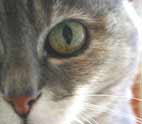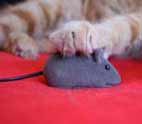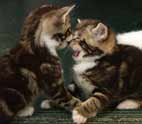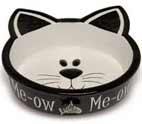Kitten Health Tips
Health Problems And Kitten Care
Kitten health will be upper most in your mind when you find yourself the proud owner of a new litter.
It can be a worrying time, especially if you have never had to look after newborn cats before.
The following kitten care information should be able to ease some of those concerns and give you some knowledge to understand any problems that may occur.
Orphan kittens are particularly at risk from illness, as they would not have received the vital Colostrum in their mother's first milk to provide them with essential antibodies.
So particular care is needed when hand raising orphan kittens. But it is always best to know how to give all kittens special attention, to help reduce the risk of poor kitten health occurring.
Birth Defects
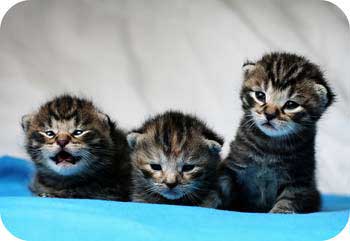
Luckily only a few kittens are born with defects from birth (known as congenital defects). However not all defects are life threatening and the kittens will be able to grow up and live a relatively normal life.
Not all defects are visible at birth. There could be heart problems that may not be apparent at first, but which will display symptoms as the kitten grows. It is therefore wise to get new born kittens checked by a vet early on, so that any such problems can be diagnosed.
A vet will also be able to check for ringworm or any other conditions which kittens may be susceptible to during these early stages of life.
The few congenital kitten health defects that can occur are:
Cleft pallet - This is a long slit like opening in the roof of the kitten's mouth. This can affect nursing, causing milk to flow into the nasal area and down into the lungs.
If the opening is very large the kitten may not be able to nurse at all. Kittens with cleft pallets can be fed with a feeding tube but you will have to decide if the cat will be able to feed properly as an adult, or it is kinder to have them euthanized.
Operations to correct a cleft pallet are possible but are difficult and expensive.
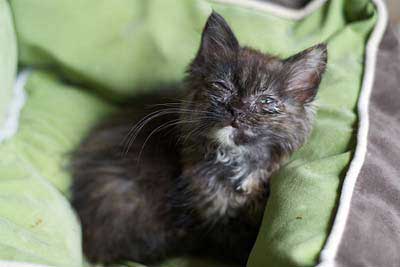
Intestinal problems - Some kittens are born with an incomplete intestinal tract. They may appear fine at birth but will become ill and may not be able to defecate.
Often these kittens will die quickly and the reason only discovered with an autopsy. Luckily this defect is very rare.
Water on the brain (Hydrocephalus) - Sadly any kitten born with this defect will die quickly. Although surgery is available for humans with a similar condition it is not something that is available for animals.
Heart defects - these can vary in severity and a kitten with a severe heart problem will not survive for long. However minor defects may be treatable with medication. These defects will be discovered by a vet examination.
Polydactyly (extra toes) - Sometimes kittens are born with extra toes on some or all of their paws. This is completely harmless and as long as they are formed properly will not need any treatment.
There are a few defects that can be caused by drugs administered or illnesses contracted by the mother cat during pregnancy. This can result in a condition known as Cerebella Hypoplasma; this is when a portion of the brain is underdeveloped.
Kittens born with this condition may appear fine at birth but as they grow they can show symptoms of being shaky or clumsy or find it difficult to eat or drink by themselves.
Kittens or cats with cerebella hypoplasia are of normal intelligence. They just have difficulty with some of their motor skills and so can have normal lives but will need extra care and attention.
Kitten health - What Kitten Care To Give, If...
Kitten not feeding
If you notice that one or all of your kittens are not nursing or will not feed at all, then there is something seriously wrong. Check:
- That the queen is producing milk
- Check the inside of the kitten's mouth to see if there is any deformity
- Make sure the kittens are not too cold
- If hand rearing, make sure you are offering the correct food in the correct way
If there are no obvious reasons for the non-feeding, seek advice from a vet immediately.
Diarrhea - a common kitten health problem
Kittens can become seriously dehydrated quickly, so it is vitally important that diarrhea is not allowed to continue for too long and that the kitten is receiving plenty of fluids.
Diarrhea can be caused by general ill health or a problem with their food if hand rearing.
If hand rearing, dilute one third of their milk formula with water. If there is no change then dilute with one half water to formula.
If symtoms persist seek immediate veterinarian advice.
Eye Infections
During the period between birth and the kitten's eyes opening (between 5 and 14 days), it is important that you check daily that there are no signs of puffiness behind the eyelid. If there is it could be down to a bacterial infection that can permanently damage the eye.
A vet will have to clean out the eyelid and you will have to apply antibiotic eye ointment daily. You will also have to make sure the eyelids do not get stuck together. This is done by gently wiping the eyes with cotton wool and warm water.
Promoting Good Kitten Health
There are many virus diseases that only affect cats and similar animals, such as:
- Feline distemper
- Rhinotrcheitis
- Calicivirus
- Feline leukaemia
Although not all are prevalent in all areas of the world some are common everywhere. Your vet will be able to tell you which ones are prevalent in your area. Having your kitten vaccinated is the safest way to prevent these illnesses.
Kittens who have been raised by their mother should start to receive their vaccinations at 7 or 8 weeks of age.
Hand raised kittens who were orphaned at birth will need to be vaccinated earlier at 5 or 6 week.
It can also be a good idea to consider taking out cat insurance to help make sure that you can afford any veterinary bills if any illness or accident occurs in the future.
I hope you have found these kitten health tips useful. Please look through my other kitten care pages for more great information and advice.
Top of this Kitten Health Page


